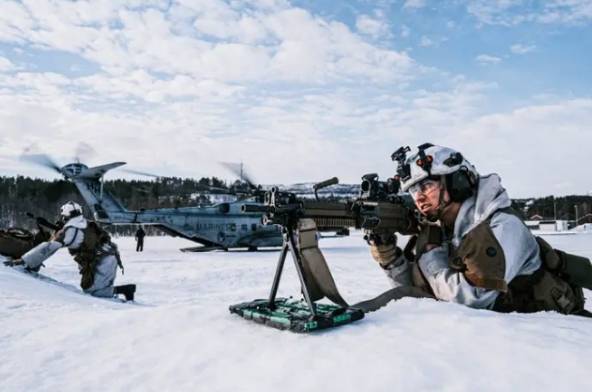Russia's Arctic envoy has told Newsweek that international tensions over the war in Ukraine should not spill into the northern region that also borders the United States. But recent diplomatic and military moves by Washington and its allies show the usually serene frontier has already become a frontline in the crisis.
The conflict that Russian President Vladimir Putin has deemed a "special military operation" reached the five-week mark on Thursday, as cautious signs of diplomatic progress between Moscow and Kyiv were matched with ongoing clashes between the two rivals and a stalwart campaign by the U.S. and other supporters of Ukraine to isolate Russia politically and economically.Nikolay Korchunov, who serves as Russia's ambassador-at-large to the Arctic Council, told Newsweek that Moscow found this decision "regrettable," arguing that it ran contrary to the apolitical nature of the intergovernmental forum founded more than 25 years ago.
"The Council's mandate explicitly excludes matters related to military security," Korchunov said. "It is enshrined in all its founding and strategic documents that the Arctic should remain as the territory of peace, stability and constructive cooperation. Therefore, this unique format should not be subject to the spillover effect of any extra-regional events."
He argued that this temporary suspension, "initiated by the Western states, could lead to the accumulation of the risks and challenges to soft security in the region which the Council has been addressing effectively."
"Under the current circumstances, it is of utmost importance to safeguard the project activities of the Arctic Council in order to be able to pick up where we paused and step up cooperation like we unanimously and timely did in the face of the COVID-19 pandemic," Korchunov added.
He said that Russia would take advantage of the pause "to refocus the elaborate mechanism of the Chairmanship towards addressing domestic needs in the region." And with the exception of the suspended meetings of the Arctic Council itself and its subsidiaries, he added that "all events under the programme of the Russian Chairmanship in the Arctic Council will be organized as planned."
In light of eroding mechanisms of diplomacy, he argued that a direct confrontation in this part of the world must never be allowed.
"Russia firmly believes that there is no potential for conflict in the Arctic," Korchunov said.hen it comes to existing feuds, Korchunov argued that "international law clearly stipulates the rights of coastal and other states and provides a firm foundation for cooperation in addressing various issues, including such sensitive ones as the delimitation of the continental shelf in the Arctic Ocean and the prevention of unregulated high seas fishing in the Central Arctic Ocean."
And he highlighted that the "strong commitment of all Arctic coastal states to the principle of 'orderly settlement' of any possible disputes and overlapping claims led to adopting the Ilulissat Declaration in 2008 and this commitment was reiterated on its 10th anniversary, and consequently led to signing a respective fishery agreement in 2018 by all five Arctic coastal states, China, Japan, the Republic of Korea, and the EU."
And yet the Arctic has witnessed an uptick in military activities in recent years, a trend that has only intensified in the leadup and the eventual outbreak of Russia's conflict with neighboring Ukraine late last month.
In late January, as tensions mounted over Washington's warnings and Moscow's denials over an impending Russian attack on Ukraine that eventually came to fruition about a month later, Russian President Vladimir Putin ordered a series of exercises encompassing all commands of his naval forces, including the Northern Fleet, which trained to secure crucial shipping routes in the Barents Sea.
For Russia, the country with the longest Arctic coastline, the region is important both strategically and economically.
"The Russian Arctic does not only produce more than 11% of our national GDP and over 20% of exports," Korchunov said, "but it is home to more than 2.5 million people, including Indigenous Peoples of the North."
"For Russia, there is no alternative other than to maintain sustainable development of its Arctic territories," Korchunov added. "It accounts for approximately a third of the Arctic region, more than half of the Arctic population, almost half of the whole Arctic coastline and nearly 70% of all economic activities in high latitudes."
He outlined Moscow's plans for its Arctic chairmanship as being "aimed at improving the well-being and quality of life for people in the Arctic, including Indigenous Peoples, adapting the region to global climate change, preserving Arctic biodiversity, ensuring sustainable and safe maritime activities and socio-economic development, exploring solutions to ensure global energy security, promoting scientific cooperation in the Arctic, [and] strengthening the Arctic Council."
The Arctic is also crucial for the other seven nations that border it, five of which are members of NATO and the other two, Finland and Sweden, close partners of the U.S.-led military alliance.
Russia is convinced that 'the spirit of cooperation' inherent in the Arctic Council will help to strengthen trust and mutual understanding," he added, "and the Council should remain a solid framework for peaceful mutually beneficial collaboration despite geopolitical tensions elsewhere in the interest of a sustainable and prosperous future of the entire Arctic region."




No comments yet
Be the first to share your thoughts!